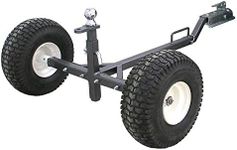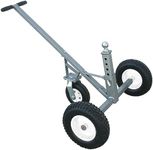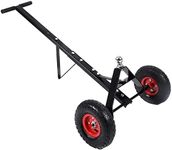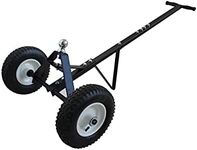We Use CookiesWe use cookies to enhance the security, performance,
functionality and for analytical and promotional activities. By continuing to browse this site you
are agreeing to our privacy policy
Best Electric Trailer Dolly
From leading brands and best sellers available on the web.#2

Tow Tuff
Tow Tuff TMD-800ATV Adjustable Solid Steel 800 Pound Capacity Trailer Dolly
View Product
#3

Trailer Valet
Trailer Valet TV5X Drill Powered Dolly Mover with Jack - 5,000 lbs Towing Capacity, 500 lbs Tongue Weight, Easy Install, Dual-Drive, Durable Powder Coat Finish, 8" Bracket, includes Drill Adapter TVDA
View Product
#4

Trailer Valet
Trailer Valet TVXLBOTH XL Trailer Dolly - 2" and 2 5/16" Ball
View Product
#5

Tow Tuff
Tow Tuff TMD-800C Adjustable Height Solid Steel 800 Pound Capacity Portable Trailer Dolly with 8-Inch Swivel Caster and 12 Inch Flat Free Tires
View Product
#6

IIT
1000 Lb Capacity Trailer Dolly with 10" Non Flat Air Tires
View Product
#7

MAXXHAUL
MaxxHaul 70225 Trailer Dolly with 12" Pneumatic Tires - 600 Lb. Maximum Capacity
View Product
Buying Guide for the Best Electric Trailer Dolly
Choosing the right electric trailer dolly can make moving your trailer much easier and safer. The key is to match the dolly’s capabilities to your trailer’s size, weight, and the surfaces you’ll be moving it on. Think about where you’ll use the dolly most often—like driveways, garages, or uneven ground—and how much effort you want to put into maneuvering. Understanding the main features will help you pick a dolly that fits your needs and makes trailer handling a breeze.Weight CapacityWeight capacity refers to the maximum load the dolly can safely move, including the trailer and its contents. This is crucial because using a dolly with too low a capacity can be unsafe and damage both the dolly and your trailer. Weight capacities are usually divided into light-duty (up to 3,000 lbs), medium-duty (3,000–6,000 lbs), and heavy-duty (over 6,000 lbs). To pick the right one, check your trailer’s total loaded weight and choose a dolly that can handle a bit more than that for safety and ease of use.
Motor PowerMotor power determines how easily the dolly can move your trailer, especially on inclines or rough surfaces. It’s usually measured in watts or horsepower. Lower-powered motors are fine for flat, smooth surfaces and lighter trailers, while higher-powered motors are better for heavier loads or sloped/uneven terrain. Consider where you’ll use the dolly most—if you have hills or gravel, opt for more power; for flat, paved areas, less power may be sufficient.
Tire Type and SizeThe tires on a dolly affect how well it moves over different surfaces. Solid rubber or polyurethane tires are good for smooth, hard surfaces, while larger, pneumatic (air-filled) tires handle grass, gravel, or uneven ground better. Smaller tires are easier to maneuver in tight spaces, but larger tires provide better stability and traction. Think about the surfaces you’ll be crossing most often and choose tire types and sizes that match those conditions.
Maneuverability FeaturesManeuverability features include things like variable speed controls, steering handles, and remote controls. These features make it easier to guide the trailer precisely, especially in tight spots. Simple, manual controls are fine for open spaces, but if you need to park in a garage or navigate around obstacles, look for features that give you more control. Your need for precision and ease of use should guide your choice here.
Battery Life and ChargingBattery life determines how long you can use the dolly before needing to recharge. Longer battery life is important if you plan to move trailers over long distances or use the dolly frequently. Charging time also matters—shorter charging times mean less waiting. If you’ll use the dolly often or for extended periods, look for models with longer battery life and faster charging. For occasional, short moves, battery life is less critical.
Hitch CompatibilityHitch compatibility refers to how the dolly connects to your trailer. Some dollies are designed for specific hitch types (like ball, pintle, or gooseneck), while others are more universal. It’s important to ensure the dolly matches your trailer’s hitch for a secure connection. Check your trailer’s hitch type and choose a dolly that fits, or one that offers adapters for different hitch styles.



